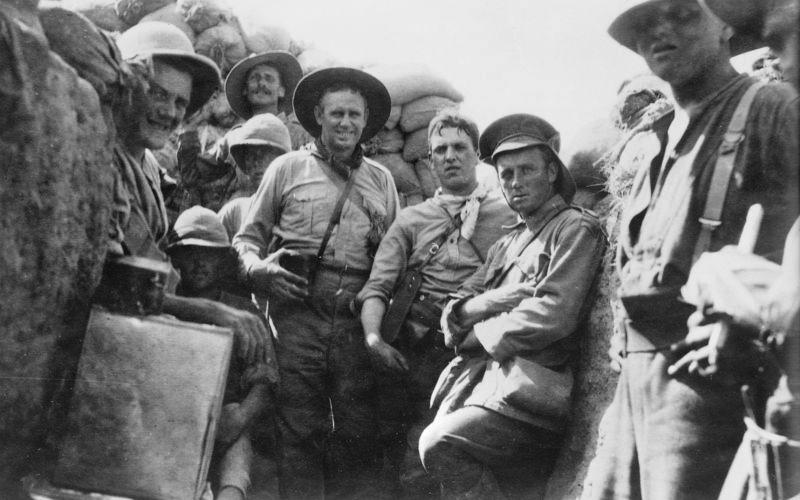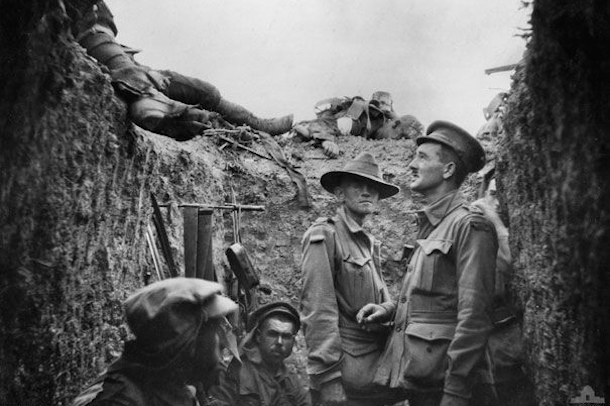
International Friendship, Borne in Conflict a Century Ago
For many people outside America, April 25th is not simply a date on a calendar this year. For Australians, New Zealanders, and Britons, April 25th celebrates the centennial anniversary of the pre-dawn landings of the Mediterranean Expeditionary Force on the beaches of the Gallipoli Peninsula in what is now modern day Turkey. Today’s Turks remain active participants in commemorations on April 25th as well, despite the fact that their ancestors rivaled the allied forces in those 100 year old battles.
In my current position I travel to the peninsula with my students, who are officers in the United States Marine Corps. It’s their job to land on hostile shores like those Anzacs did a century ago, so I have occasion to talk about how hard it was then and how equally hard it is today. We talk about those men and what they did in 1915, and we all understand that if Marines had to do something similar today, some of them would also wind up in the well-tended graves of our own national cemeteries.
Interestingly though, April 25th has become a day of convergence for the nations involved in the bloody landings on the Gallipoli Peninsula. In Australia, the day is known as Anzac Day, and it commemorates the Australian and New Zealand Army Corps, which fought on the peninsula in 1915.
New Zealanders and Britons observe the day as well and all three nations celebrate the memory of those who fought and those who died. Turks, in large numbers, are always in attendance. The essence of the day, in my view, is the Dawn Service, during which the well-known Fourth Stanza of Lawrence Binyon’s 1914 poem, For the Fallen, is famously read aloud.
“They shall grow not old, as we that are left grow old:
Age shall not weary them, nor the years condemn.
At the going down of the sun and in the morning,
We will remember them.”
The Gallipoli Campaign began on February 19th, 1915, and lasted through January 8th, 1916. It swept in men from around the globe. In this sense, it was unlike any other campaign in the First World War because of the origins and diversity of its combatants. The landings involved 70,000 men from the United Kingdom (including Scots, Irish, and Welsh), Australia, New Zealand, and France (including North Africans). Indians, (including Pakistanis), Gurkhas, and Canadians soon followed. The Ottomans had a similar number of men, and their conscripted army included Turks, Arabs, Armenians, Jews, Kurds, and a number of smaller minorities. Germans and Austro-Hungarians fought alongside the Ottoman army. Roughly 60,000 allied soldiers were killed and a similar number of Ottomans died as well.
In many ways the Gallipoli campaign was a coming of age for Australia and New Zealand as these nations entered the mainstream of the twentieth century. The battles and associated casualties served to drive the peoples of those nations to build national identities and a sense of national pride. Britain had asked for help from her commonwealth, and the selfless and immediate response was instrumental in the survival of the British Empire. Today, Australians consider themselves egalitarian, informal, and irreverent. They have an image as a muscular and independent people, and they have become strongly nationalistic in their own right.
This was a critical affirmation for the governments and peoples of the former colonies. Likewise, the campaign was important for the Ottomans as it served notice on the Western imperialist powers that the Ottomans were back in the game. The Turks inherited this legacy, and Gallipoli served as a sort of national turning point from being humiliated as the “sick man of Europe” to being known again as an opponent of some worth.
In the years since the end of the First World War, the Gallipoli experience and its remembrance became an important part of the building of friendly relations between the Turks and their former enemies. For many years after the war, it was not uncommon for British, Australian, and New Zealand veterans groups to visit the peninsula and join with Turkish veterans groups for commemorative observances. Reciprocally, Turks went to London, Canberra, and Christchurch to pay tribute there as well. Old soldiers and their commanders forged strong friendships in the first half of the twentieth century. The celebration of Anzac Day on the peninsula, held within sight of the landing beach and its cemetery, became institutionalized and drew the presidents and prime ministers of four countries.

In effect, a lasting and transgenerational friendship became embedded in the collective consciousness of the nations that spent the blood of their young men on the Gallipoli peninsula. Although the survivors themselves are now long dead, the tradition continues. April 25th remains a day of memory and mourning but it is not a day of sadness or anger.
Given the brutal nature of trench warfare in the First World War, how do we explain April 25th as a day of convergence rather than a day of wrath? The truth is that Gallipoli was a soldier’s battle. It was not what is known as materialschlacht (a war of armaments), characterized by millions of shells and hundreds of machines. Unlike the mass anonymity of the Western Front in France, individual personalities emerged on the Gallipoli peninsula, and in this regard it was more like the battles of the previous century.
Reinforcing this point, most of the time the combatants at Gallipoli observed archaic rules of war, making this, in General Erwin Rommel’s words, kreig ohne hass (war without hate). Neither side massacred prisoners. Both sides observed truces to evacuate wounded and bury the dead. Atrocities and war crimes were almost unknown on the peninsula. It then came to pass, amidst the violence, that the soldiers of each side developed a grudging respect and admiration for their adversaries. “Johnny Turk” became a term of affection rather than one of derision. Civilians were not present on the peninsula and, and in this sense, the battles were “clean” without collateral non-combatant casualties. While the battles there were brutal, they were not nearly as soul shattering or as punishing as those raging in France the same year. In the end, the casualties from the Gallipoli campaign numbered about a quarter of those from the Marne, Verdun, and the Somme. As a consequence, the veterans of the Gallipoli campaign and their heirs were inclined to remember their experiences and their adversaries in a more favorable light than their counterparts elsewhere in the war.
April 25th, although an anniversary of war, is a day of convergence and it brings people of different nations together. If you ever have an opportunity to attend a Dawn Service on Anzac Day, I hope that you’ll go and I promise you a memorable and moving experience.

